Introduction to Kindness and Recovery
In the challenging journey of recovery, whether from addiction, trauma, or mental health issues, kindness can be a potent ally. Acts of compassion and generosity toward oneself and others not only create a supportive environment but also facilitate healing on multiple levels. By understanding the psychological and physiological impacts of kindness, we can harness its potential to transform recovery experiences.
Psychological Benefits of Random Acts of Kindness
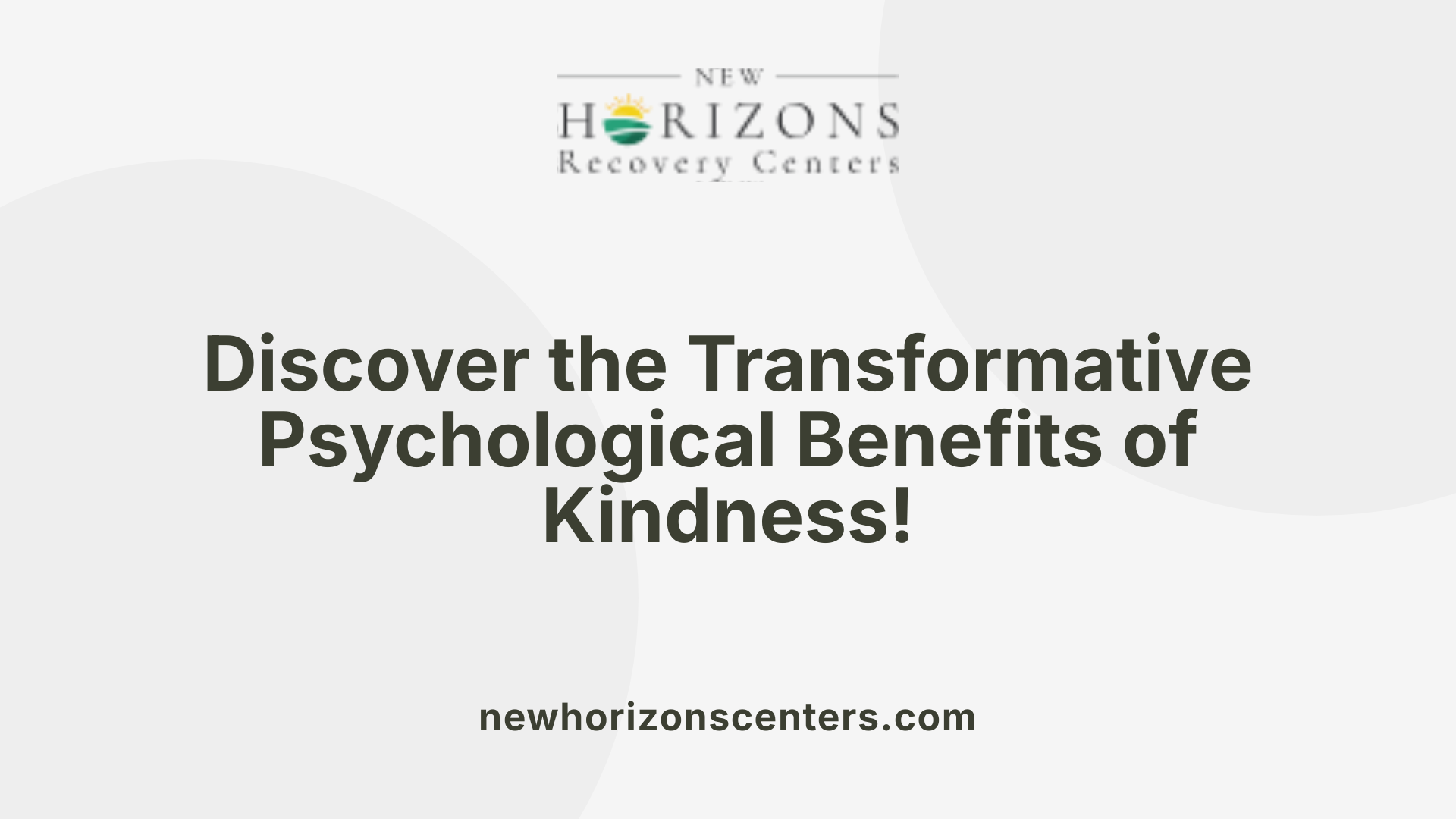
What are the psychological benefits of random acts of kindness?
Random acts of kindness offer significant psychological benefits for both the giver and the receiver. Engaging in kind acts results in the release of neurochemicals such as serotonin and oxytocin, which are linked to feelings of happiness and well-being. This biochemical reaction can help reduce symptoms of anxiety and depression, contributing to better mental health overall.
Acts of kindness boost self-esteem and foster a sense of connectedness among individuals. By building trust through gentle interactions, people can re-establish interpersonal safety, crucial for those who have experienced trauma.
Encouragingly, the benefits of kindness extend beyond the individual level. They create a ripple effect within communities, promoting a culture of support and empathy. Simple gestures, like complimenting a stranger or volunteering, not only provide immediate emotional boosts but also encourage others to engage in kindness, enhancing the spirit of community connection.
This collective approach to practicing kindness not only contributes to personal satisfaction but also reinforces social bonds, ultimately leading to a more compassionate and resilient society. Exploring the far-reaching impacts of kindness reveals its power to reshape individual lives and foster a nurturing environment for all.
Kindness as a Catalyst for Mental Health and Recovery
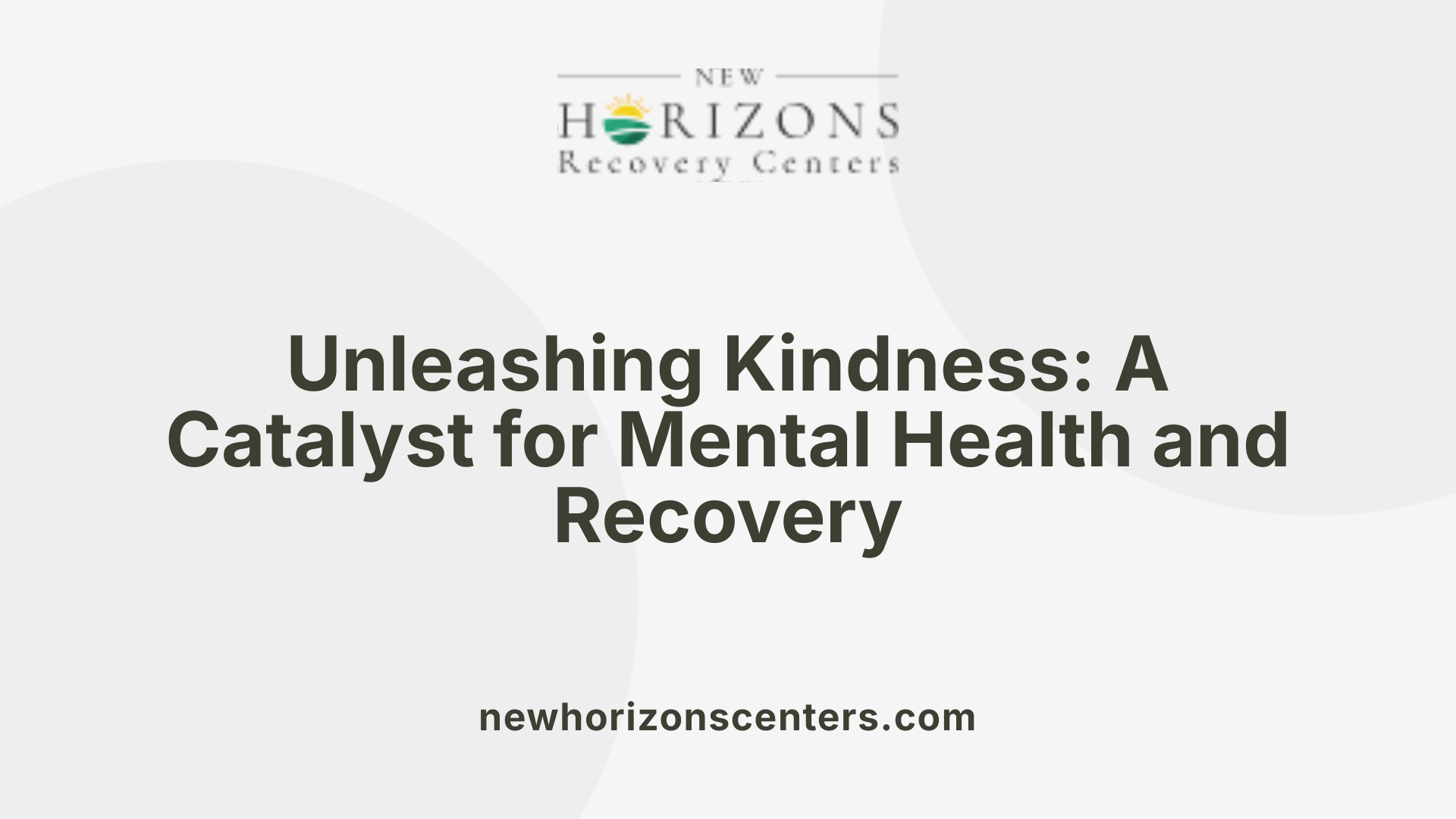
How does kindness improve mental health and support recovery?
Kindness plays a transformative role in enhancing mental health and fostering recovery. Engaging in acts of kindness fosters a deeper sense of belonging and reduces feelings of isolation. Not only does it involve helping others, but it also encompasses being compassionate toward oneself, imparting significant benefits for emotional well-being.
Studies have shown that both giving and receiving kindness boost mood and happiness levels due to the release of neurochemicals such as serotonin and oxytocin. These hormones play crucial roles in reducing stress and fostering positive feelings, contributing to an increased sense of self-worth and a more optimistic outlook.
Impact of kindness on stress reduction
Practicing kindness effectively diminishes stress levels, with research revealing that kind individuals experience 23% less cortisol, the primary stress hormone. Simple acts, such as volunteering or comforting someone, not only alleviate stress for others but also uplift one’s own emotional state. These positive interactions create a supportive community that nurtures mental health, making it crucial for those on the road to recovery.
Self-compassion in recovery
Self-compassion is a powerful aspect of kindness, especially for individuals in recovery. By treating oneself gently and with understanding, individuals can overcome feelings of self-doubt and shame associated with past behaviors. This nurturing approach promotes resilience, allowing one to appreciate their value while also motivating further positive actions.
Boosting morale and self-esteem
Acts of kindness bolster self-esteem and morale, creating a ripple effect that strengthens social connections. Whether through small gestures or significant efforts, these acts reinforce one's sense of contribution to society, leading to sustained improvements in self-worth. Celebrating these contributions enhances feelings of gratitude and community, essential for a fulfilling recovery process.
In essence, embracing kindness—be it through self-kindness or outward actions—serves as a vital tool for enhancing mental health and facilitating a supportive environment for recovery.
Trust, Well-being, and the Social Benefits of Kindness
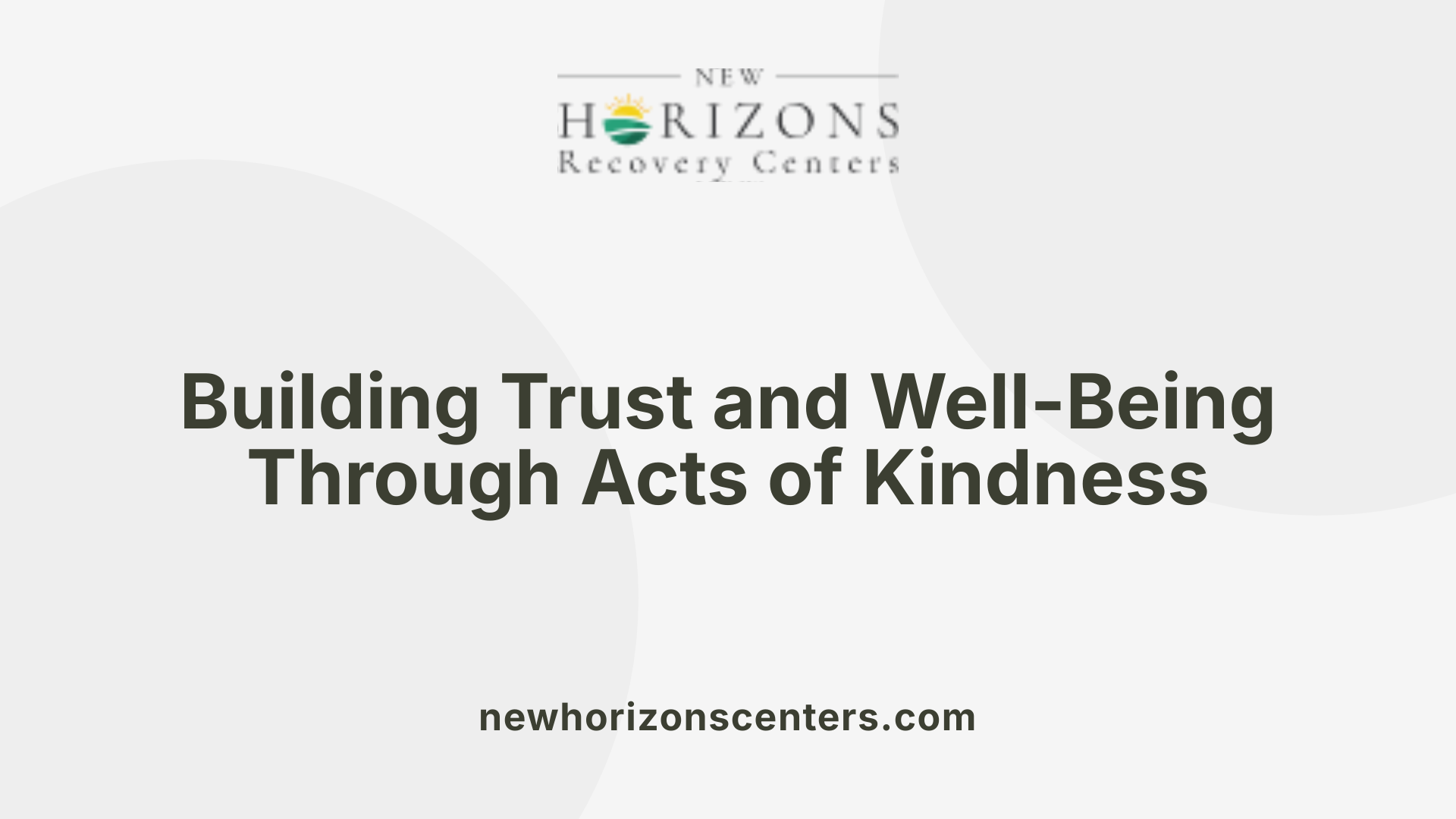
What is the importance of performing acts of kindness in building trust and enhancing well-being?
Performing acts of kindness is vital in building trust and enhancing well-being because it fosters positive emotional connections between individuals. Kindness boosts the mood of both the giver and the receiver, creating a sense of happiness that can ripple out to larger social networks.
By engaging in kind acts, individuals demonstrate reliability and compassion, essential components of trust in relationships. These actions not only help to nurture bonds but also significantly contribute to emotional resilience, particularly for those recovering from trauma or addiction.
The physiological benefits of kindness are notable as well; releasing neurotransmitters like serotonin and oxytocin helps alleviate stress and enhances overall mental health. Oxytocin is known to improve cardiovascular health and foster feelings of connectedness, which decreases feelings of isolation often present in recovery environments.
Ultimately, kindness creates a cycle of goodwill that reinforces social bonds, cultivates a healthier, more trusting atmosphere, and enhances the emotional well-being of individuals, making it a cornerstone of supportive communities.
Additional Insights on Kindness and Trust
Acts of kindness contribute to a supportive environment essential for healing, especially in recovery scenarios. Here’s a brief overview of the interconnected benefits:
| Aspect | Impact of Kindness | Example |
|---|---|---|
| Building Trust | Engenders reliability and compassion | Complimenting someone to acknowledge their efforts |
| Enhancing Well-being | Boosts mood through neurotransmitter release | Helping a neighbor can improve both parties' emotional states |
| Reducing Stress | Lowers cortisol levels, encouraging relaxation | Participating in community volunteering to foster connections |
| Creating Connection | Builds social ties and decreases isolation | Organizing a kindness event in the neighborhood |
Encouraging kindness is essential for those in recovery, highlighting the profound effects it has on individual and community health.
Kindness in Action: Healing and Stress Reduction
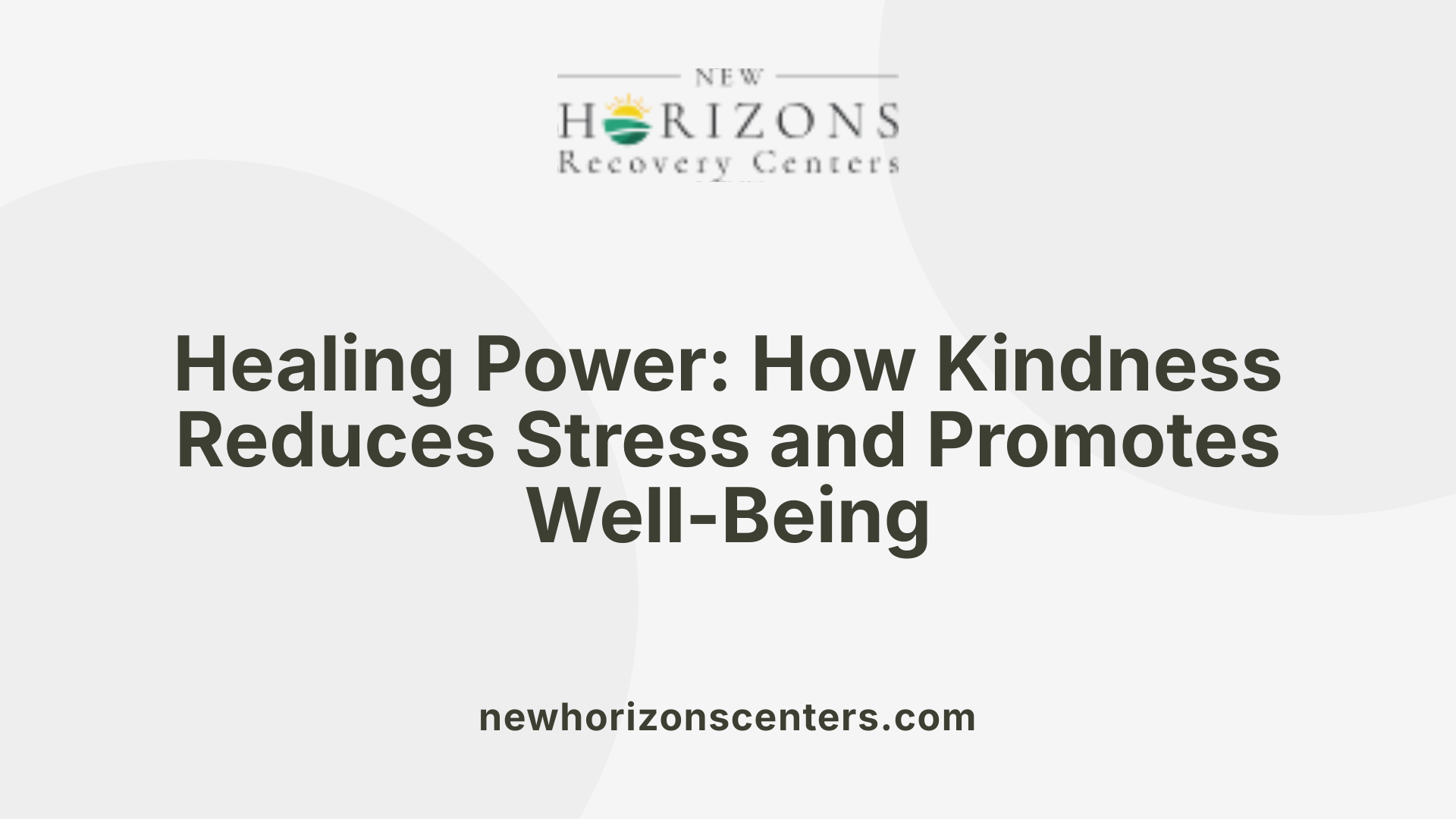
In what ways do random acts of kindness promote healing and reduce stress?
Random acts of kindness are powerful tools for promoting healing and reducing stress. They create a sense of connection and belonging within communities, essential elements of good mental health. Such acts often lead to deeper friendships and robust social support networks, diminishing feelings of isolation and loneliness.
Furthermore, kindness boosts self-esteem and optimism, enhancing overall emotional well-being. This uplift is supported by neurochemical changes in the brain: engaging in kind acts triggers the release of happiness-related hormones like oxytocin, serotonin, and dopamine.
Examples of simple acts of kindness
Acts of kindness don't need to be grand to be impactful. Small gestures can make a significant difference, such as:
- Complimenting a friend to boost their morale.
- Sending a thoughtful message to check in on someone.
- Volunteering time at a local charity or community project.
- Offering to help a neighbor with daily tasks.
The role of kindness in emotional healing
Acts of kindness foster emotional healing by helping individuals feel seen, heard, and valued. They can disrupt cycles of negative thoughts, promote self-compassion, and enhance emotional resilience. Moreover, the act of helping others often acts as a distraction from personal struggles, enhancing one's perspective on life. By participating in a culture of kindness, communities not only support individual recovery journeys but also bolster collective well-being, creating a ripple effect that fosters enduring positivity.
Building a Culture of Kindness in Recovery Communities
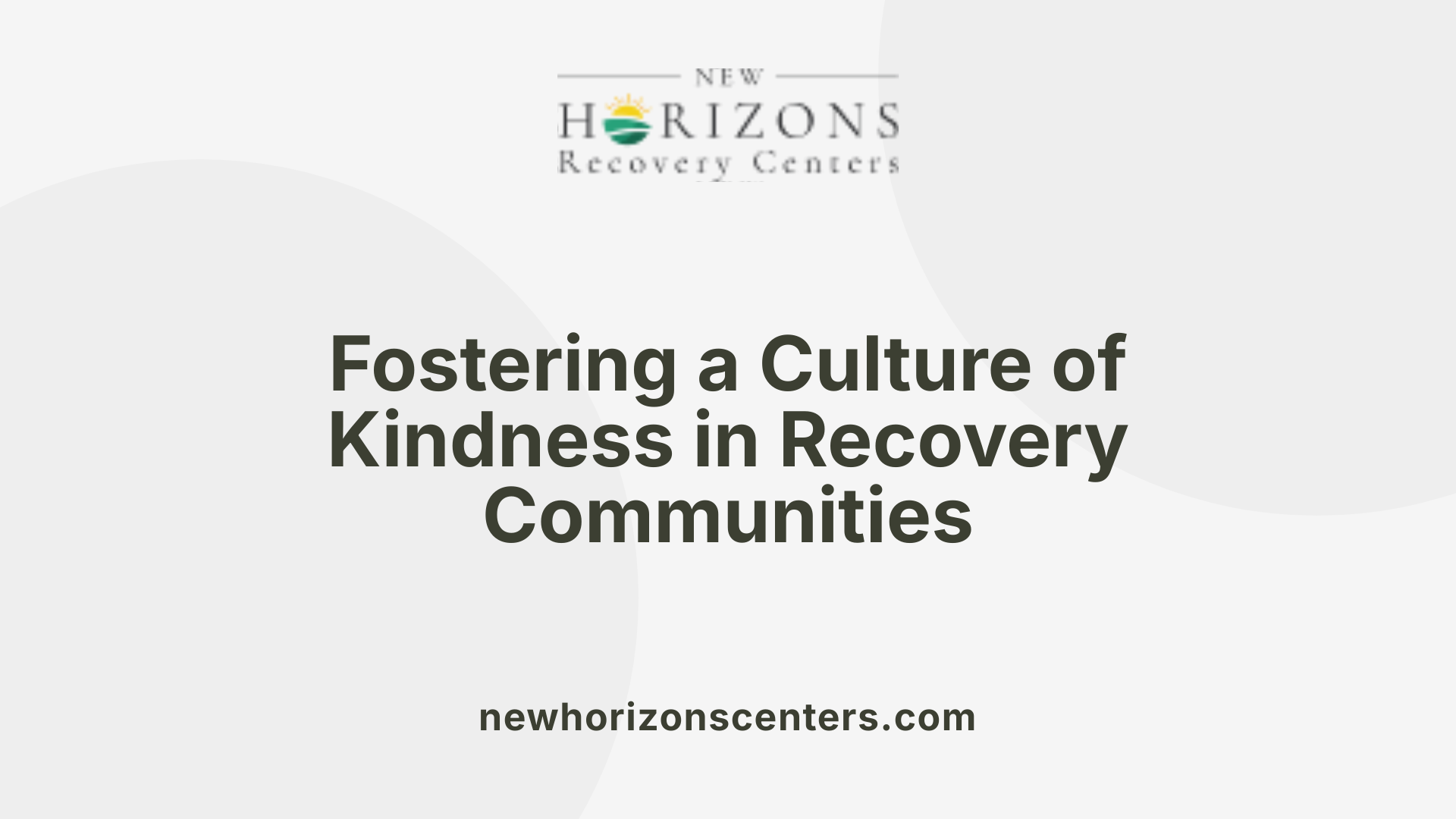
Kindness as Community Support
Engaging in acts of kindness can significantly enhance the emotional well-being of individuals in recovery from addiction. Small gestures, such as listening, complimenting, or offering emotional support, create a sense of belonging and reduce feelings of isolation. These acts not only foster strong relationships among community members but also promote an atmosphere where individuals feel seen, heard, and valued.
Long-term Benefits of Kindness in Recovery
Practicing kindness contributes to the long-term recovery journey by enhancing self-esteem and promoting positive emotional states. Studies indicate that the release of neurochemicals like oxytocin and serotonin results from kind actions, boosting mood and fostering feelings of happiness. Over time, these benefits can create a ripple effect, inspiring others to engage in similar acts, thereby solidifying a supportive network that is crucial for sustained sobriety.
Incorporating Kindness in Recovery Programs
Recovery programs can integrate kindness into their frameworks by encouraging participation in community service or kindness-focused activities. Volunteering is one such avenue, providing individuals with purpose and connection. Programs that prioritize kindness not only cultivate emotional resilience but also build a positive environment that supports healing and encourages individuals to maintain their recovery journey.
Final Thoughts on Kindness and the Recovery Journey
Ultimately, the journey of recovery is nuanced and challenging, yet incorporating elements of kindness can transform the experience significantly. Not only does kindness improve mental and physical health, but it also fosters community, builds trust, and promotes a supportive network essential for healing. By embracing random acts of kindness, both individually and collectively, we can pave the way for more compassionate, effective recovery pathways for everyone involved.
References
- How Random Acts of Kindness Heal | Psychology Today
- Why Practicing Kindness in Recovery Matters - Freedom Detox
- Kindness is Good for Mental Health and Overall Well-being
- Recovery and Random Acts of Kindness - Renaissance Ranch
- Kindness matters guide | Mental Health Foundation
- Benefits of Practicing Kindness in Recovery - Pyramid Healthcare
- Random Acts of Kindness You Can Do for Someone in Recovery

-ink.jpeg)
-ink.jpeg)
-ink.jpeg)
-ink.jpeg)
-ink.jpeg)
-ink.jpeg)
